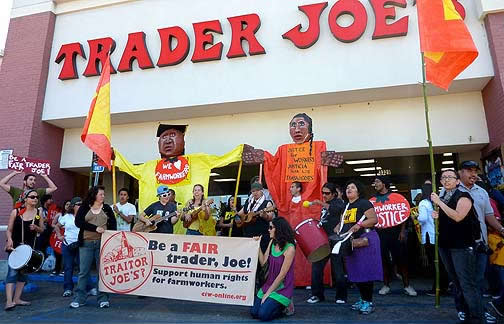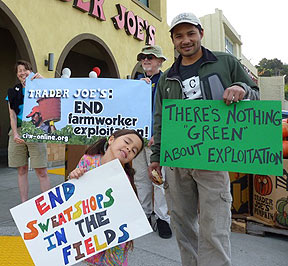
TJ’s: We’ll endorse the Fair Food Code of Conduct,
we just won’t enforce it…
In our last update, we took a first look at Trader Joe’s recent “Note to Our Customers,” a two-page treatise on why Trader Joe’s is refusing to put its purchasing power behind the growing Campaign for Fair Food. In that post we touched on how Trader Joe’s had taken some pretty impressive liberties with the facts, and we gave a brief preview of a point-by-point debunking of the company’s remarkably weak (and disappointingly unprincipled) communique.
Today we are posting our full point-by-point response, so the record can be set straight.
 But first… Before debunking, a bit of decoding is in order. Beyond getting the facts right, we’d be remiss if we didn’t share our broader analysis of Trader Joe’s latest statement on the Campaign for Fair Food — just what it all really means once you boil off the froth of misinformation and baseless insinuations.
But first… Before debunking, a bit of decoding is in order. Beyond getting the facts right, we’d be remiss if we didn’t share our broader analysis of Trader Joe’s latest statement on the Campaign for Fair Food — just what it all really means once you boil off the froth of misinformation and baseless insinuations.
And that is this: While Trader Joe’s may not understand exactly how the penny-per-pound Fair Food premium works at this point, paying the surcharge certainly doesn’t seem to be the principal barrier to the company’s participation in the Fair Food program.
Rather, Trader Joe’s problem is with the Fair Food Code of Conduct, and, specifically, with adhering to the Fair Food Code of Conduct. In its latest statement, Trader Joe’s flatly refuses to allow anyone — not even an independent third-party tasked with verifying whether or not growers are in compliance with the Code — to influence its purchasing decisions.
And that, as they say in the negotiating business, is a deal-breaker, since it is the Code of Conduct, and the new market incentives it has established in the Florida tomato industry, that is driving real change in the fields today.
We will “endorse” the Code, we just won’t enforce it… The Fair Food Code of Conduct is the set of human rights standards with which Florida tomato growers must comply if they are to be considered participating growers for the purposes of the Fair Food program. It has been adopted by well over 90% of all Florida Tomato growers. It has also been adopted by nine multi-billion dollar food corporations, most of them much larger — and with much broader and more intricate supply chains — than Trader Joe’s. It is the Florida tomato industry standard, and as such has put Florida tomato growers on the “road to becoming one of the most progressive groups in the fruit and vegetable industry.”
Yet it seems that Trader Joe’s — despite the fact that the company has few rivals when it comes to proclaiming its commitment to ethical purchasing practices — somehow thinks it can opt out of the Fair Food Code. Specifically, Trader Joe’s appears to be intent on removing all teeth from the Code, rejecting outright the idea of terminating purchases from suppliers found to be in violation of its standards. And a code of conduct without teeth is no code at all.
To understand this code of conduct shell game, it is necessary to first take a look back before looking more closely at the company’s latest statement. In its first “Note to our customers about Florida tomatoes and the CIW,” released nearly two months ago, Trader Joe’s declared that the company itself would have no part of any agreement that included the Code of Conduct, but it would agree to buy from suppliers, or wholesalers, who have signed Fair Food agreements, including the Code of Conduct:
|
“We have made it clear to the CIW that Trader Joe’s does not sign agreements that allow third party organizations to dictate to us what is right for our customers. However, the wholesalers and growers with whom we work in Florida have agreed to sign a CIW “fair food” agreement which would guarantee that all tomatoes from Florida in Trader Joe’s meet all aspects of the CIW standards.” read more |
While this arm’s length arrangement is far from ideal — and unnecessarily complicated — we are willing to assume that Trader Joe’s is good to its word and will require its suppliers to sign Fair Food agreements, Code and all.
Which brings us to the company’s latest statement, in which even this thin reed of acceptance is bent to the point of snapping. The only reference to the Code in the entire two-page release does not appear until the bottom of the second page, as the fifth of six “undefined or overreaching factors” in the Fair Food agreement that the company lists. Number five reads:
|
“5. The draft agreement requires Trader Joe’s to terminate any vendor or supplier upon written notice from the CIW. This is one of the reasons for our characterization of ‘overreaching.’” |
While this is far from an accurate characterization of the agreement (it is the finding of the independent auditor, not the CIW, that triggers the termination of a grower), it does make one thing perfectly clear: Trader Joe’s is not prepared to enforce the Fair Food Code of Conduct, even if its suppliers adopt it. And that, quite simply, is unacceptable.
 Standards are standards, whether they are for human rights or for organic certification… Trader Joe’s is a leading retailer of organically certified products. The company’s support for the emerging organic market is one of the primary reasons for its reputation as a progressive grocer.
Standards are standards, whether they are for human rights or for organic certification… Trader Joe’s is a leading retailer of organically certified products. The company’s support for the emerging organic market is one of the primary reasons for its reputation as a progressive grocer.
Yet, if a third-party auditor were to decertify a producer — take away its organic certification — because the producer’s practices had fallen out of compliance with organic standards, surely Trader Joe’s would respect that decision. Otherwise, its claim of offering organic products would be a farce, if not a fraud.
And that is all the Fair Food Program asks of retailers when it comes to human rights standards. If a grower fails to comply with the standards of the Fair Food Code of Conduct, participating retailers must be willing to enforce the Code with market consequences — including termination of purchases.
Yet it seems that Trader Joe’s doesn’t want anyone telling them where they can or can’t buy their tomatoes, no matter what a third-party monitor finds to be happening on the farm. This is the exact attitude – “I want the cheapest tomato possible, no questions asked” – that bred the industry’s past abuses.
And that’s the problem. Because in the end, if Trader Joe’s insists on its right to buy tomatoes from farms where human rights violations — from slavery to sexual harassment — are found, then they are not even “endorsing” the Fair Food Code of Conduct. They’re just encouraging and enabling those who would violate it.
And that puts them squarely at the rear of the retail food industry when it comes to progressive purchasing policies, behind Whole Foods, behind McDonald’s and Subway, behind even Yum Brands. Hardly where you’d expect to find one of the “world’s most ethical companies.”
Now, finally, after that rather lengthy detour, click here to see the point-by-point debunking of Trader Joe’s latest “Note to Our Customers”.
Oh, and, as Trader Joe’s says, “Thanks for listening”…
